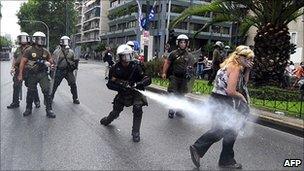Greece vote may bring only temporary relief
- Published
- comments

Clashes between police and protesters resumed in central Athens on Wednesday
ATHENS The last volley of tear gas echoed across Syntagma Square outside the Greek parliament at around 0130 in the morning.
The lines of police thinned out. They had been involved in skirmishes for 14 hours.
Morning broke with glaziers replacing windows at the bottom end of the square. The street cleaners tacked back and forth. The Greeks excel at cleaning up after a riot. Those arriving for work clamped tissues over their mouths and noses. The air was acrid, the tear gas still potent.
Today the parliament will vote on the austerity measures. On the streets there is resignation. The expectation is that parliament will approve the measures. Tomorrow there is a vote on implementing the bill.
A deputy with the governing Socialist party (Pasok) says he will vote against the bill, but thinks he will be the only MP to rebel and break ranks.
But here's the thing. No one in Greece believes the tax increases, lay-offs, privatisations will ever be fully implemented. This morning I bumped into Elias Iliopoulos, the General Secretary of the Civil Service Union. He thought the measures would be approved, but he predicts that Greece is heading for elections in the autumn. Depending on the result, the whole deal may have to be renegotiated with the EU and IMF.
If the budget cuts are approved Greece will receive the next tranche of money from the original bail-out. The 12bn euros (£10.7bn) will stave off a default in mid-july. Then the EU and IMF will work on a second bail-out thought to be around 120bn euros.
The EU will breathe a huge sigh of relief if parliament votes "yes", but there will not be a Greek national consensus behind the plan.
The opposition in Greece is adamant: the austerity medicine did not work the first time around. It won't work this time either, they say. All that will happen is that Greece's debt mountain will continue to grow. Even people in government believe default is inescapable eventually.
(Interestingly, if the Greek parliament rejects the EU/IMF deal many officials in Brussels believe the EU will find some emergency funding to prevent Greece defaulting.)
Although tens of thousands were on the streets yesterday the unions - holding a 48-hour general strike - did not get the hundreds of thousands they had been predicting.
Perhaps people feared violence. Perhaps they have grown protest-weary. They promised today to encircle parliament and prevent deputies arriving to vote. They won't. They do not have the numbers on the streets. Even so, the MPs have to weave their way through streets blockaded by police buses.
Greek democracy is under strain.